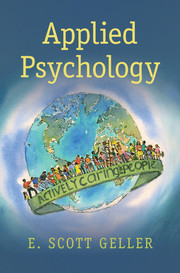Book contents
- Frontmatter
- Dedication
- Contents
- Foreword
- Preface: The Actively Caring for People (AC4P) Movement
- About the Authors
- Acknowledgments
- INTRODUCTION TO PART I EVIDENCE-BASED PRINCIPLES OF AC4P
- INTRODUCTION TO PART II APPLICATIONS OF AC4P PRINCIPLES
- Epilogue: Where Do We Go from Here?
- Subject and Name Index
- References
Epilogue: Where Do We Go from Here?
Published online by Cambridge University Press: 05 March 2016
- Frontmatter
- Dedication
- Contents
- Foreword
- Preface: The Actively Caring for People (AC4P) Movement
- About the Authors
- Acknowledgments
- INTRODUCTION TO PART I EVIDENCE-BASED PRINCIPLES OF AC4P
- INTRODUCTION TO PART II APPLICATIONS OF AC4P PRINCIPLES
- Epilogue: Where Do We Go from Here?
- Subject and Name Index
- References
Summary
I believe most people want to do the right thing, and care profoundly about the hardships of others. Unfortunately, the majority of us remain silent until after misfortune falls on someone else. Consider this discerning statement by Martin Luther King, Jr.: “History will have to record that the greatest tragedy of this period of social transition was not the strident clamor of the bad people, but the appalling silence of the good people.”
Our challenge is to shatter the “appalling silence” sooner rather than later. This call for proactive AC4P behavior is easier for me to proclaim than for all of us to do. We don't instinctively know how to offer advice, feedback, or support to promote well-being or prevent possible misfortune, even a tragedy. And it's certainly easier to avoid proactive AC4P behavior and reflexively continue working for soon, certain, positive and self-serving consequences than to intervene – to actively care.
This book introduced and explained effective techniques for intervening on behalf of the welfare of others. Lack of knowledge is no excuse. This book shared evidence-based advantages of using AC4P principles – humanistic behaviorism – to improve the quality of life in various situations. Indeed, it is better (i.e., more reinforcing) to give (i.e., to actively care) than to receive. So a lack of motivation is no excuse.
To the silent majority: Let's no longer stay passive, quiet, and inconspicuous. Reflect on these issues and resolve to join the AC4P Movement to make our world safer, healthier, and more positive. To read and understand the contents of this book is not sufficient. Teach others the AC4P principles and applications shared here. Yet education alone will not suffice.
PRACTICE AC4P PRINCIPLES
If we are to make the vision of an AC4P culture of compassion real, we need you to put AC4P principles into practice. And it's important to note the worthwhile outcomes of your AC4P endeavors. When you document the methods and results of your AC4P behavior on behalf of one or more persons’ well-being, your competence to teach AC4P to others and convince them to get on board will be enhanced considerably.
The best teachers relate the information they're teaching to personal experiences – they are intimate storytellers. The authors of each chapter of this text have observed direct and/or indirect benefits of one or more AC4P interventions.
- Type
- Chapter
- Information
- Applied PsychologyActively Caring for People, pp. 645 - 654Publisher: Cambridge University PressPrint publication year: 2016



